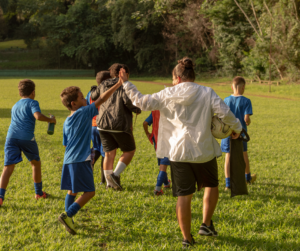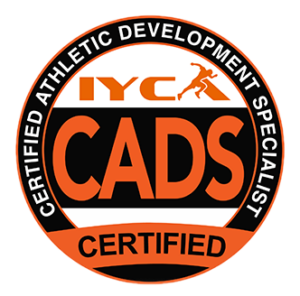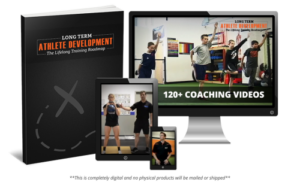Many youth sports coaches mistakenly embrace the notion that the pressures to succeed in the present and the immediate future overshadow what is likely best for the athlete.
 Winning today’s game or this weekend’s tournament becomes paramount, regardless of the actual importance of the event or its positioning in light of the Long Term Athlete Development (LTAD) model. In this case, coaching styles are very much reflective of the need to win.
Winning today’s game or this weekend’s tournament becomes paramount, regardless of the actual importance of the event or its positioning in light of the Long Term Athlete Development (LTAD) model. In this case, coaching styles are very much reflective of the need to win.
Performance and perfectionist-based philosophies are employed during practice and game settings. When performance is not reflective of the level of skill or perfection that the coach desires, yelling, belittling, and negative criticism often follow.
Perhaps even more devastating to the developing athlete, many parents ascribe to the same errant thought process. Demonstrating advanced skills and achieving success at all developmental levels are conceived as the most important factors for participating in youth sports.
Some parents offer negative feedback, harsh criticisms, or inappropriate comments during the game. The message sent to the young athlete is clear: success now is most important.
What is more, continued success is the only defense from negative feedback that can undermine confidence, self-esteem, and ultimately the perception of self-worth (1-Rowley S. Psychological effects of intensive training in young athletes).
Trainers and training centers dedicated to working with young athletes may fall within this category, as well. However, the efforts of the International Youth Conditioning Association (IYCA) and like-minded organizations and professionals have started to turn the tide against such notions.
Conversely, young athletes functioning under the coach who ascribes to the LTAD model are taught to search for continual improvement rather than immediate performance as the principal marker of athletic success. This mentality encourages the young athlete to develop a far more useful and powerful approach to success and personal improvement— both athletic and otherwise—that may be utilized across the lifespan.
With this approach firmly developed and well-entrenched, the individual is motivated to improve rather than motivated to perform. While subtle, the influence in thinking of such a difference is profound. Reasoning and creativity are enhanced. Problem-solving skills are better developed.
 Perhaps most importantly, self-worth is preserved because “success” is an ability demonstrated over time rather than an instantaneous or momentary expression of skill linked directly to any one specific performance.
Perhaps most importantly, self-worth is preserved because “success” is an ability demonstrated over time rather than an instantaneous or momentary expression of skill linked directly to any one specific performance.
Also encouraging is that enhanced reasoning and creative abilities enable the young athlete to solve new and more challenging sport-related tasks over time, thereby further increasing ability.
Because such athletes associate success with improvement rather than performance, burnout and dropout issues that currently plague youth sports culture may be averted.
Ultimately, such an approach can teach the young athlete to love physical activity simply because refining movement skills and developing physically is intrinsically linked to holistic self-improvement and may be viewed as a series of steps toward success rather than the more typical model of physical activity as a measure in determining aptitude.
Youth sports and training for youth sports have largely become exercises of pressure and fear.
Repercussions for poor performance or lack of aptitude or skill are oftentimes severe. Many young athletes today have lost the joy and innocence of what sport and fitness participation truly is, and the stark reality is that they never fully develop a lifelong love for movement.
So, the question becomes- do you believe this needs to change?
If YES, then this article can be a step in the journey to provide extraordinary experiences to your athlete(s), by learning both the science and the practice of youth conditioning and fitness. The next step would be to get further education around Long Term Athlete Development and the Craft of Coaching Youth.
We invite every person with the desire to positively impact the field of youth fitness and athletic development to join our cause and become part of the worldwide revolution. It’s as simple as our 3 E’s.
Step 1: Educate Yourself with science-backed, tried & true methods that stand the test of time.
Step 2: Elevate Athletes by applying LTAD and always working at becoming better at ‘meeting kids where they are at’.
Step 3: Expand the mission into your communities with programs, classes, and educational opportunities in your hometown.
Ready to join the mission?
 Get started with one of our Top Credentials- the IYCA Certified Athlete Development Specialist.
Get started with one of our Top Credentials- the IYCA Certified Athlete Development Specialist.
Not ready to get Certified, then our Long Term Athlete Development Resource is the perfect next step.
Resource is the perfect next step.
Let’s make the most positive Impact we can make today!
We are right there with you,
– The International Youth Conditioning Association
References:
1- Rowley S. Psychological effects of intensive training in young athletes. Journal of Child Psychology and Psychiatry and Allied Disciplines. 1987;28(3):371-377.
2-Toby Brooks, Ph.D., David Stodden, Ph.D., Jim Kielbaso, MS. Essentials of Youth Conditioning and Fitness. 2020, 21-23.

